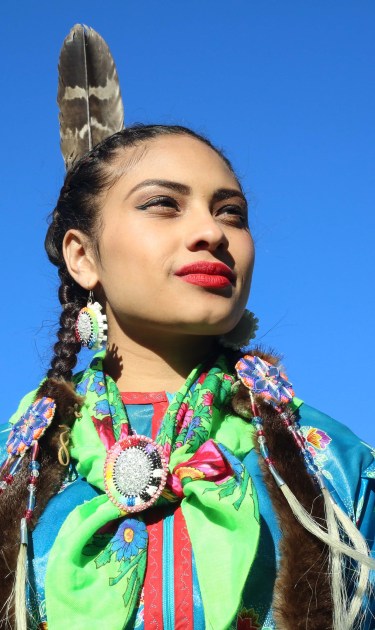In 1937, under President Franklin D. Roosevelt, October 12th was declared the national holiday we know now as Columbus Day. The story written in textbooks is that an Italian man named Christopher Columbus – and his three famous ships, La Pinta, La Niña, and La Santa Maria – sailed the ocean blue in 1492 until he “discovered” The Americas, changing the world as we know it forever. Needless to say, this G rated-limited narrative omits the rape, murder, and intentional violence of the forced colonization that came with Christopher Columbus.
In recent years, multiple cities, including Phoenix, AZ, Minneapolis, MN, Seattle, WA, Albuquerque, NM, and the state of Vermont have recognized Indigenous People’s Day as a counter holiday that celebrates the contribution of First Peoples of this land. On October 10th hundreds came together on Randall’s Island to celebrate Indigenous People’s Day and honor the life, resistance, resilience, and knowledge of indigenous peoples of The Americas. Palo santo was burned throughout the day, tobacco was scattered into the Harlem River, and different indigenous groups shared their prayers and dances throughout the day.
Remezcla caught up with five attendees who talked to us about the #NoDAPL Movement, Columbus Day, and what it means to them to be an indigenous person in today’s social and political climate.
All photos by Itzel Alejandra Martinez for Remezcla.
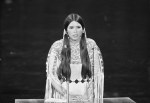
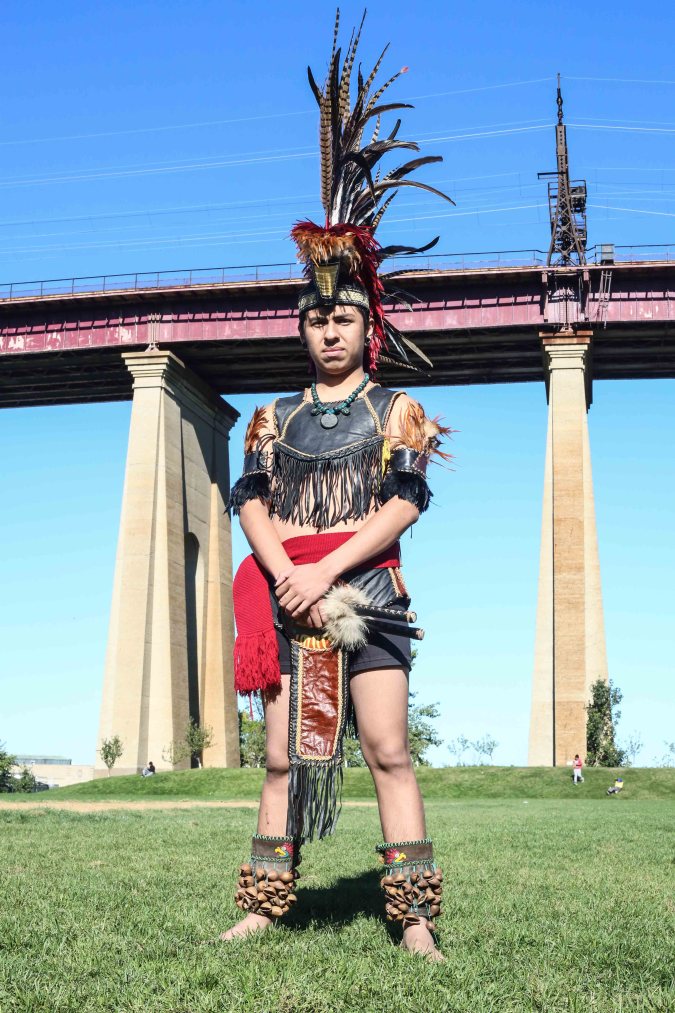
Nicolas Najera, Mexica from New York
Why did you come here today?
It’s Columbus Day or whatever, but to me it’s really Indigenous Day. I always follow my traditions.
What does it mean to you to be an indigenous person in today’s social and political climate?
I just feel very unique. Nowadays, our youth, I don’t even think they really know about their traditions anymore. Personally, my parents got me into this, ever since I first saw them [Mexica dancers], I thought ‘Hey, this is nice, I like this.’ I do it for myself and for my fellow ancestors.
How has the #NoDAPL Movement influenced and/or affected you?
I’m actually doing a project on that in school, I think it’s pretty messed [up]. It’s all messed up, you know, ’cause we need water. Water is our main need to keep us alive. I have a friend here who just went to South Dakota, his name is Eagle Sun. Over here in New York we’re all complaining about how it’s terrible, but he went to South Dakota, and it’s nothing compared to this. It’s way worse.
What do you hope to see change for indigenous people in the near future?
I just hope that we don’t get more stuff taken away from us. Our needs as indigenous people, our stuff that we own—I just hope to see that they don’t take more stuff away from us anymore.
Thoughts on Columbus Day?
Columbus, you know, he didn’t really discover anything, he just took the wrong way. It’s not really his day, it’s our day, us as indigenous people. A day where we get to show other people our traditions [and] what we follow with our fellow ancestors.
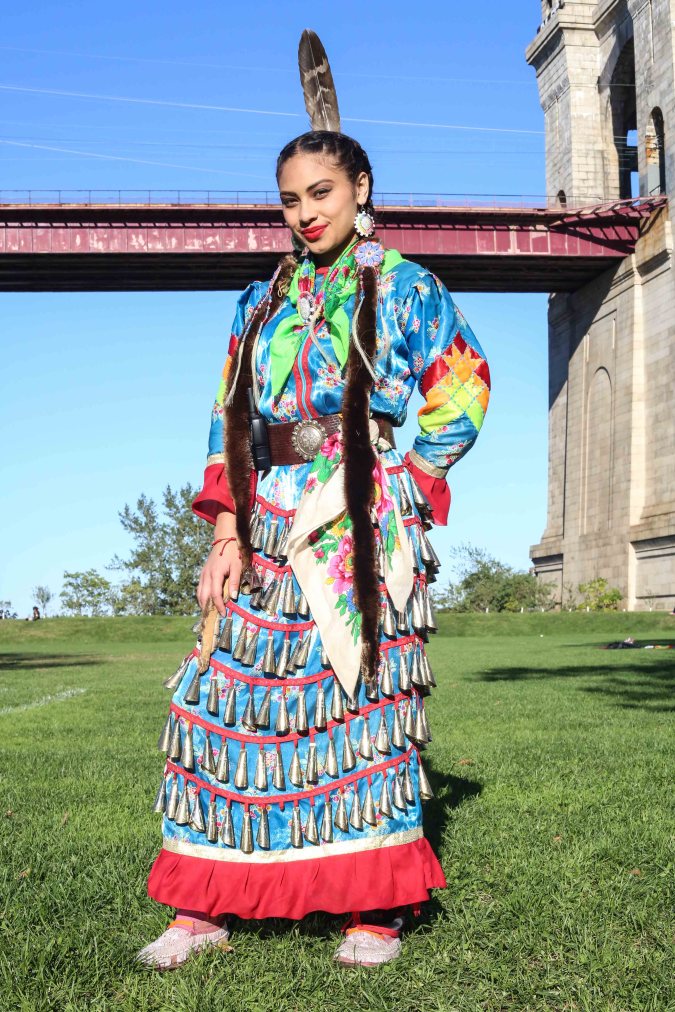
Valerie Rivera, Taína from Connecticut
Why did you come here today?
I’m just happy to be here, you know, just showing everybody that we’re still here, we’re still alive.
What does it mean to you to be an indigenous person in today’s social and political climate?
When you mention Natives to people and they’re like, what? They’re still here? You know, I’m just happy to represent, to show people we’re still here.
How has the #NoDAPL Movement influenced and/or affected you?
It actually inspired me. I drove 24 hours to get there, just one way. I went over there, I helped out in the kitchen, I did a lot of community work with them. It inspired me to a better person and to not take things for granted, especially water. We all have that bad habit of taking water for granted. It might not be here tomorrow.
What do you hope to see change for indigenous people in the near future?
To keep showing everyone how beautiful we are and how wrong they were about us. Showing everyone how beautiful our culture is and our music and our dancing, everything, our regalías, you know, just to keep it alive.
Thoughts on Columbus Day?
There’s multiple countries out there that don’t celebrate Christopher Columbus, they call it Indigenous Peoples’ Day. So you know, it might take a while for New York to change it, but it’s just a matter of time. Patience is the key.
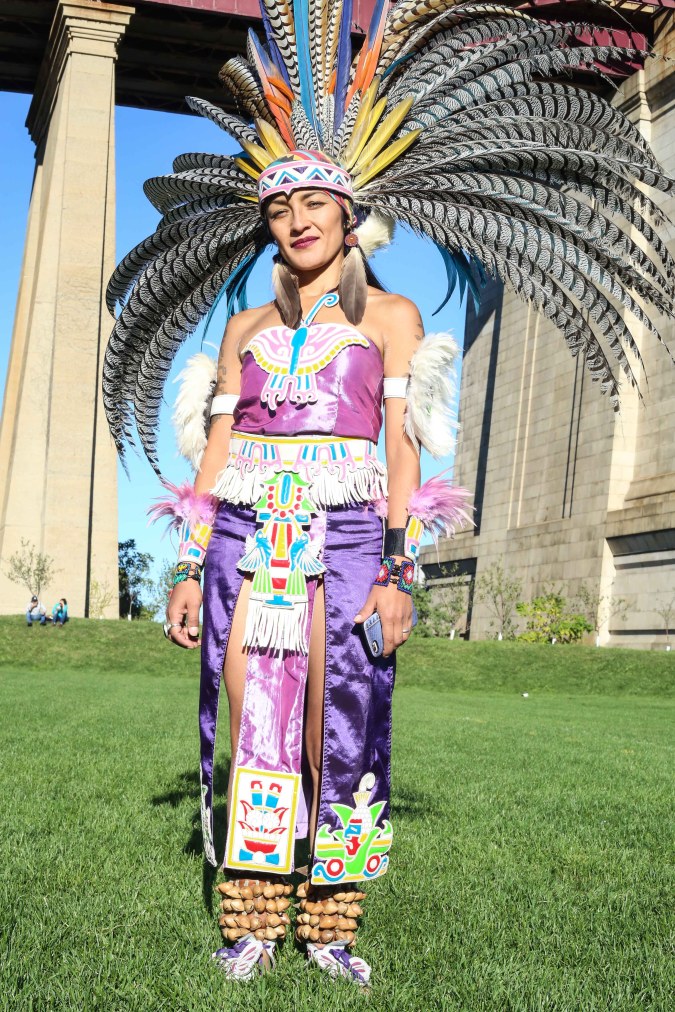
Quetziquetl, Calpulli from Mexico DF
Why are you here today?
To celebrate Indigenous People’s Day
What does it mean to you to be an indigenous person in today’s social and political climate?
It has the same meaning it has always had, we are always here. Our difference is that we have a sense of respect that moves us to pray and ask for permission to do what we do. To be able to live, to harvest, to be in this land here, Earth.
How has the #NoDAPL Movement influenced and/or affected you?
It’s affected me so much. It affects us all as human beings first of all, because there’s a lack of respect for Mother Earth. There is no respect for indigenous people and our legacies, our beliefs, our love, our ancestors, our dead. Many years ago they came to invade, saying that they came to conquer –it’s the same story. It repeats itself. So here we are, always peacefully resisting, the way we were taught by our ancestors, always peacefully. With love, everything becomes clear.
What do you hope to see change for indigenous people in the near future?
Respect. Respect towards the indigenous, respect towards their beliefs, towards the way we pray. We perceive life differently, so in the future, I would just like for our children to be able to pray without hiding. We don’t hide like we used to, but hopefully in the future there will be more respect towards those children that are growing up with our beliefs…For them to have their space. To have freedom. That’s what I want to see.
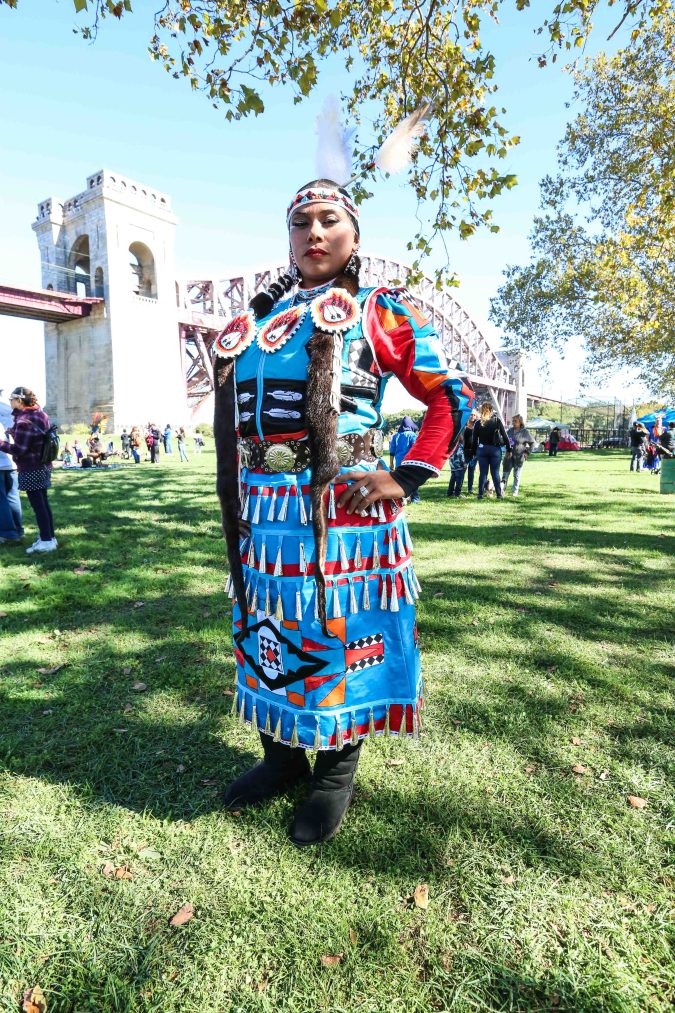
Leah Bluemorningstar Bermudez, Lumbee, Eastern Cherokee, and Aztec from Brooklyn
Why did you come here today?
I come here to celebrate Indigenous Peoples’ Day, because [America] was not discovered by Columbus, and we’re trying to change that here in New York City, New York State. It was invaded by Columbus and the settlers.
What does it mean to you to be an indigenous person in today’s social and political climate?
We are very proud people. So I give thanks to the creator every day for choosing me to be Native American. We are different. They hardly talk about us in the government. Obama was the first president to really mention Native People, and I’m so proud of that. We are the lowest of the low. They never talk about us. We still live in reservations—those are concentration camps. It’s unfortunate, because I have to show a tribal card to prove my lineage to Native America, being Native Indian, indigenous. Why do I have to show a tribal card to prove who I am? No other race has to do that but Natives. I think that’s a disgrace.
How has the #NoDAPL Movement influenced and/or affected you?
I think it’s the devil. They’re trying to ruin our water on that reservation. I’m not from North Dakota, but I’m still Native, and for them to try to put a pipeline to ruin the water, it’s not just ruining the reservation, it’s everybody near it. It’s not just Natives going to be affected. Whoever’s living around the reservations will be affected. You cannot have oil come in the water—then we’re going to die. Water is life.
What do you hope to see change for indigenous people in the near future?
That maybe we could give up the tribal cards. We want to be recognized. Not just, like, thrown in the corner. They never talk about indigenous Native Americans, never. People still come to me [like], ‘you’re still alive?’ That is ridiculous. So I just hope that they could recognize that we are still here. We never left.
Thoughts on Columbus Day?
I feel it should be changed because it’s a disgrace. He was a settler, he came and stole and killed, raped, murdered, [instigated] genocide, everything. He wrote journals on how he murdered the Taíno. I just feel that he should not be worshipped. And they’re changing [the holiday] in different cities, and New York state should be next. So I just hope and pray that they recognize that: We were here. He did not discover, he invaded.
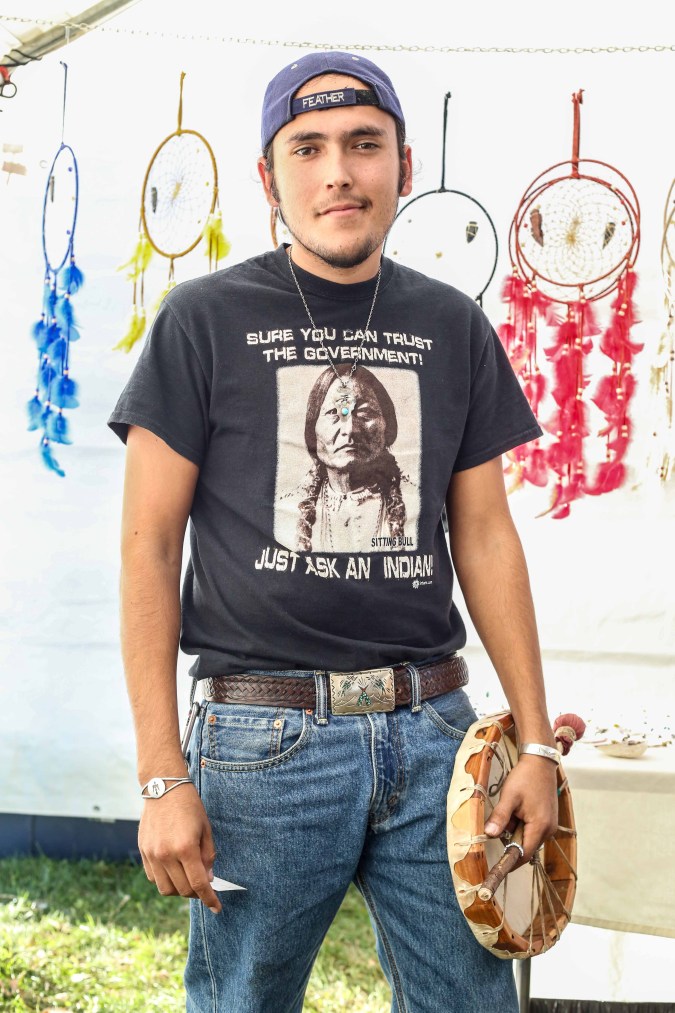
Lance A. Kelly, Navajo from Florida based in Arizona
Why did you come here today?
My mom and dad’s side and my grandparents on both sides of my family did the East Coast pow-wow trail, selling jewelry. I came out here because both sides of my family did. My family’s made a big business doing this. It’s all Navajo and Zuni stuff.
What does it mean to you to be an indigenous person in today’s social and political climate?
I feel proud to be native. I am just worried about the kids. They need to keep remembering this kind of stuff. Like our drum and what our stones mean, what these feathers represent, what these songs mean. What you’re hearing right now, that drum, to us, is a heartbeat of the earth. It’s a way to bring our people together into this circle. I just hope that the younger generation will keep learning it. The only thing I think is, shoot, back on the res, we learn traditional ceremonies and stuff like that but even my brothers and sisters aren’t as interested in it, and if my brothers and sisters aren’t interested in it as much as I am, it worries me.
How has the #NoDAPL Movement influenced and/or affected you?
I think the No Dakota Access Pipeline [movement is] pretty cool in bringing together all these different people. It’s happened to us too: Navajo Nation, we’ve got fracking going on, underneath, the uranium gets leaked into our underwater aquifer. I’m very happy that the people at Standing Rock are doing what they’re doing. I[t] means you’ve got support—we always see it on Facebook, but you’ve got support from people in other countries, you’ve got support from all these other natives out here, and we’re here.
What do you hope to see change for indigenous people in the near future?
Actually it’s what I don’t want to see change. There’s one ceremony that I have that’s very close to me, it’s our Native American church ceremony, and it’s a NAC way of living. It’s where we use these teepees and these different lodges—it’s a church, it’s all it is, where we can come together and we can sing these songs of prayer. And it’s looked down at by a lot of people because we have a medicine that we use called peyote. I’ve eaten that medicine since I was less than one years old, and I’ve never had any problem, never hallucinated or anything. It’s part of us as Native people. If you don’t know anything about that and you mess with a medicine like that and just eat it, it’s going to hurt you, it’s not going to help you in any way. But if you know, if that medicine was given to you by god, which we say as Navajo people, that it’s a god-given gift to Native American people, and you use it the right way, it’s going to help you a lot. So I would hope that that ceremony never gets taken away from us. I hope that our eagle feathers are one day more easily accessible to Native American Church card holders only, and dancers, of course. But protected, as well, because a lot of people just want to go after these birds. But there’s a lot of these, the government says that if we want feathers all we have to do is ask them, and that’s a lie. Because we ask them for feathers, and they never send them. I just hope that our ways are protected and everything’s good for our younger generations. Because I got little brothers and sisters I hope keep up with all of our stuff.
